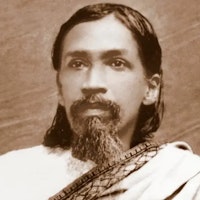“What thou art within, that outside thee thou shalt enjoy”; no machinery can rescue you from the law of your being.
“What thou art within, that outside thee thou shalt enjoy”; no machinery can rescue you from the law of your being.
Sri Aurobindo

What Thou Art Within
Topic: Spiritual Growth & Practice
This erring race of human beings dreams always of perfecting its environment by the machinery of government and society, but it is only by the perfection of the soul within that the outer environment can be perfected. “What thou art within, that outside thee thou shalt enjoy”; no machinery can rescue you from the law of your being. What then shall be our ideal? Unity for the human race by an inner oneness… the pouring of the power of the spirit into the physical and mental instrument, so that we shall exceed our present state as much as this exceeds the animal state from which science tells us we have issued.
Sri Aurobindo (1872-1950) was an Indian philosopher, poet, and spiritual teacher whose writings have significantly influenced modern spiritual thought. Born Aurobindo Ghose on August 15, 1872, in Kolkata, India, he was sent to England for his education, attending St. Paul's School in London and later King's College, Cambridge. Despite his Western education, Sri Aurobindo reconnected deeply with India's spiritual heritage upon returning to India, where he became involved in the movement for independence from British rule.
In 1910, after narrowly escaping arrest due to his revolutionary activities, Sri Aurobindo moved to Pondicherry (now Puducherry), a French colony in India, dedicating himself to spiritual practice and writing. He developed Integral Yoga, a philosophy aimed at transforming human life by integrating all aspects of one's being—physical, vital, mental, and spiritual. His major works include "The Life Divine," "Savitri," and "Essays on the Gita," which explore his vision of human potential and spiritual evolution.
The Mother, born Mirra Alfassa on February 21, 1878, in Paris, France, joined Sri Aurobindo in 1920 and became his spiritual collaborator. She played a crucial role in establishing the Sri Aurobindo Ashram in Pondicherry. Together, they worked to create a spiritual community dedicated to the practice of Integral Yoga. After Sri Aurobindo's passing in 1950, The Mother continued their work, founding the experimental township of Auroville in 1968 as a place where people from around the world could live in harmony and pursue spiritual development. Her efforts have left a lasting legacy, inspiring spiritual seekers globally.
Wilson, Andrew, editor. World Scripture II. Universal Peace Federation, 2011, p. 983 [Sri Aurobindo, To Love Is to Know Me: The Bhagavad Gita for Daily Living; Sri Aurobindo's Teachings and Yoga, Next Future blog].

Sri Aurobindo
Theme: Spiritual Growth

Sri Aurobindo, To Love Is to Know Me: The Bhagavad Gita for Daily Living
Transformation of Human Consciousness
Transformation of Consciousness is the key to lasting social transformation: Machinery cannot bring the millennium
The source of all perfection as well as imperfection lies in human consciousness. The state of the Society is an exact reflection of the state of human consciousness “What thou art within, that outside thee thou shalt enjoy; no machinery can rescue thee from the law of thy being”. All the products of the human Mind like Science, Technology, Economics, Politics, Morality, Religion, Philosophy, Culture, failed to perfect society because they are not able to transform the nature and consciousness of Man. At worst, they have mechanized and brutalized man; at best they brought some refinement to the surface being of Man, while the deep subconscious roots of his ignorance, imperfection and suffering remained untouched. Sri Aurobindo never denied the immense utility of these mental pursuits of man in the preparation and education of human consciousness for its higher destiny; he never denied them as meaningless illusions like the traditional spiritualist. But he denies the cock-sure faith of the modern scientific and rational mind in these powers of the mind, that they can perfect Man and his Society. So the only sure path towards a lasting social transformation that Sri Aurobindo envisages is an inner psychological and spiritual discipline of consciousness, which will release and uplift the individual and collective consciousness of Man into a higher level of consciousness beyond Mind – an inherently Perfect and Integral Consciousness which can bring lasting peace, harmony, and fulfillment to human life.
—M.S. Srinivasan [M.S. Srinivasan, the Sri Aurobindo Society, The Next Future blog].
Resources
Related Quotes
Copyright © 2017 – 2026 LuminaryQuotes.com About Us